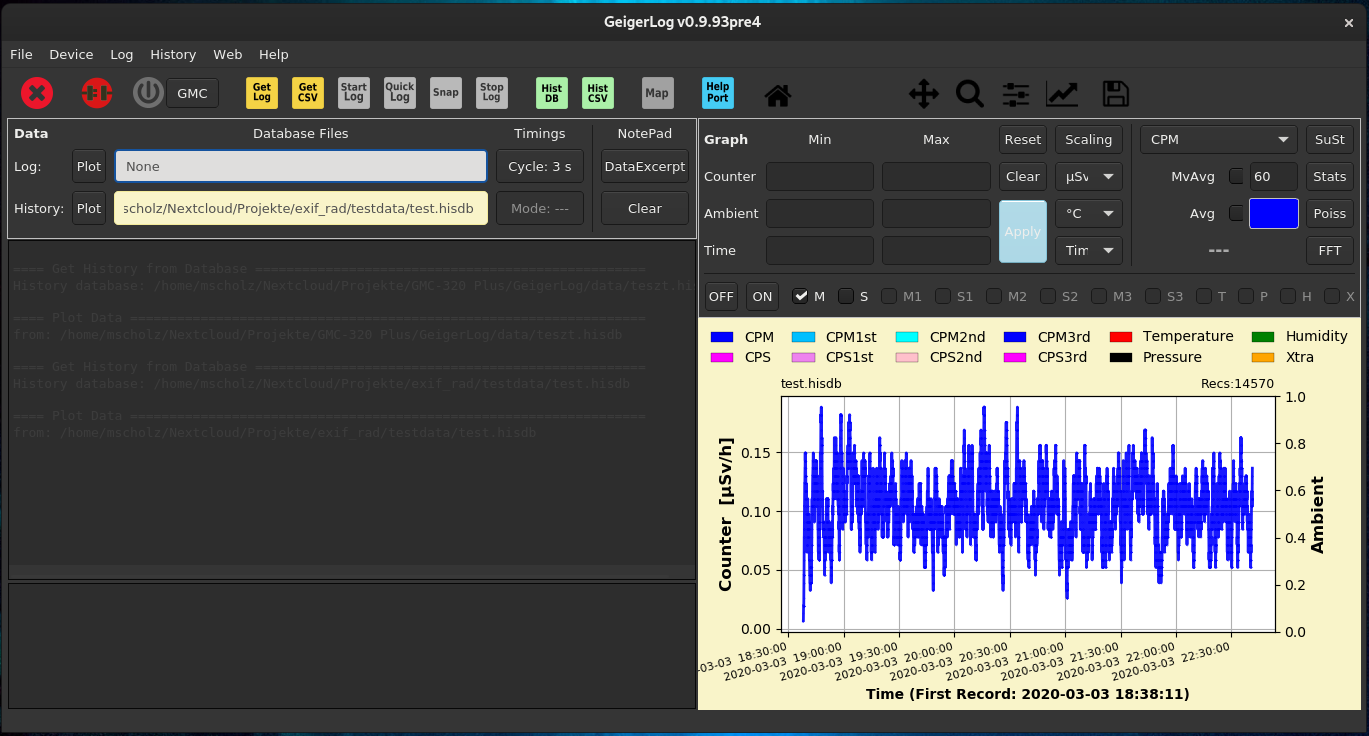Major rewrite following OOP style. Adds GPS/GPX handling. See merge request Commander1024/radiation-tagger!1
radiation tagger
rad_tag.py is a simple unix-style cross-platform Python 3 tool which can write certain tags to an image file.
It can scan a couple of images, extract their Exif-tags, and compare the DateTimeOriginal with other sources.
It can parse a .his (CSV) file from a GeigerLog file export and calculate the radiation in µS/h using the factor in sifactor.
It can optionally read a gpx-file, compare the timestamps to 'DateTimeOriginal' and determine closest-matching latitude / longitude / altitude. Timestamps in GPX files are ususally stored in UTC timezone, you can set --timezone to match the local timezone, your camera / geiger counter ran at.
It then creates a UserComment with the actual measured radiation at the time the photo has been taken and writes the geocoordinates into the appropiate Exif tags.
Dependencies
Right now it depends on the following non-core Python 3 libraries:
- py3exiv2 A Python 3 binding for (lib)exiv2.
- boost.python3 Welcome to Boost.Python, a C++ library which enables seamless interoperability between C++ and the Python programming language.
- exiv2 Exiv2 is a Cross-platform C++ library and a command line utility to manage image metadata.
- gpxpy gpx-py is a python GPX parser. GPX (GPS eXchange Format) is an XML based file format for GPS tracks.
Requirements
- A bunch of images (jpg, cr2, etc.) with its time of creation stored in
DateTimeOriginal. - GeigerCounter log file in csv format as it is being exported by the software GeigerLog.
- Optionally a GPX (1.0 / 1.1) track that has been recorded during the same timeperiod.
All sources are matched by their timestamp, so all sources have to be recorded during the same time (and timezone). The Geiger counter has to log a value every second, as the script compares the timestamps exactly.
These exported .his files look like this:
# ID , time in isoformat , CP/M, CP/S
149654, 2020-02-27 05:12:42, 13.0, 0.0
Usage
usage: rad_tag.py [-h] [-si SIFACTOR] [-tz Timezone] [-d] [-g GPX] [-o OUTDIR]
CSV Photo [Photo ...]
A unix-tyle tool that extracts GPS and/or radiation data from GPX/CSV files
and writes them into the Exif tags of given photos.
positional arguments:
CSV Geiger counter history file in CSV format.
Photo One or multiple photo image files to process.
optional arguments:
-h, --help show this help message and exit
-si SIFACTOR, --sifactor SIFACTOR
Factor to multiply recorded CPM with. (default:
0.0065)
-tz Timezone, --timezone Timezone
Manually set timezone of CSV / and Photo timestamp,
defaults to UTC if omitted. This is useful, if the
GPS-Logger saves the time incl. timezone (default:
utc)
-d, --dry Dry-run, do not actually write anything. (default:
False)
-g GPX, --gpx GPX GPS track in GPX format (default: None)
-o OUTDIR, --outdir OUTDIR
Directory to output processed photos. (default: .)
Examples
Use test.hisdb.his and walk.gpx from testdata and modify (overwrite) all .JPG files in place.
./rad_tag.py ./testdata/walk.hisdb.his --gpx .d/testdata/walk.gpx -tz Europe/Berlin ./testdest/*.JPG
Modifying photos in place (overwrite)
filename date / time Matched Data
_MG_3824.JPG 2020-03-15 16:17:54+01:00 ☢: 0.05µS/h Lat.: 51.92611112 Long.: 7.69379252 Alt.: 93.0m
_MG_3825.JPG 2020-03-15 16:18:12+01:00 ☢: 0.08µS/h Lat.: 51.92620192 Long.: 7.69360727 Alt.: 91.7m
_MG_3826.JPG 2020-03-15 16:18:12+01:00 ☢: 0.08µS/h Lat.: 51.92620192 Long.: 7.69360727 Alt.: 91.7m
_MG_3827.JPG 2020-03-15 16:18:12+01:00 ☢: 0.08µS/h Lat.: 51.92620192 Long.: 7.69360727 Alt.: 91.7m
Use test.hisdb.his in folder 'testdata', read all files from 'testsource' and write them to 'testdest'.
./rad_tag.py ./testdata/walk.hisdb.his -o ./testdest --gpx ./testdata/walk.gpx -tz Europe/Berlin ./testsource/*
Modifying photos in /home/mscholz/testdest (copy)
filename date / time Matched Data
DSC_0226.JPG 2020-03-15 15:02:04+01:00 ☢: N/A Lat.: N/A, Long.: N/A Alt.: N/A
DSC_0227.JPG 2020-03-15 15:11:43+01:00 ☢: N/A Lat.: N/A, Long.: N/A Alt.: N/A
_MG_3804.JPG 2020-03-15 15:59:11+01:00 ☢: 0.06µS/h Lat.: 51.92582544 Long.: 7.68739496 Alt.: 95.4m
_MG_3805.CR2 2020-03-15 16:01:49+01:00 ☢: 0.05µS/h Lat.: 51.92314108 Long.: 7.69078156 Alt.: 104.2m
_MG_3805.JPG 2020-03-15 16:01:49+01:00 ☢: 0.05µS/h Lat.: 51.92314108 Long.: 7.69078156 Alt.: 104.2m
_MG_3807.CR2 2020-03-15 16:07:02+01:00 ☢: 0.08µS/h Lat.: 51.9235013 Long.: 7.69250565 Alt.: 101.3m
_MG_3807.JPG 2020-03-15 16:07:02+01:00 ☢: 0.08µS/h Lat.: 51.9235013 Long.: 7.69250565 Alt.: 101.3m
GeigerLog setup
The Software is Open-Source and can be downloaded from Sourceforge.
Configure GeigerLog to use the GMC-Geiger counter
The GMC device has to be enabled in the geigerlog.cfg which is located in the main program directory. Because GS (GammaScout) is preactivated, it can be disabled, while you want to enable GMC
GSActivation = no
GMCActivation = yes
The GMC* defaults are quite sane, but you might want to set the correct serial port:
usbport = /dev/ttyUSB0
GeigerLog can also use a bunch of other devices while still outputting a csv-file in compatible format.
Using GeigerLog to download history
Now the program can be started by double-clicking geigerlog or by executing ./geigerlog on the command prompt.
Once connected to the device (in any power state) by pressing 'Ctrl+C' , you can download the history ('History' -> 'GMC Series' -> 'Get History from Device'). You will be asked to choose a filename for the hisdb-file (SQLITE format).
GeigerLog now presents you a rendering of the radiation over time in its main window:
Once imported, you can export the history into a hisdb.his-file, which is basically the CSV-file rad_tag.py can process. Choose 'History' -> Save History Data into .his file (CSV)'.
GPS setup
Especially if you use a mobile phone for GPS-logging. Take care, the app can use GPS when turned off, and let it write position sufficiently often. Threshold is 5 minutes by default, but precision will improve when logging more often. Especially "inactivity detection" might become a problem, when staying at one place for a period of time.
future possibilities
- It might get a setup.py if I want to waste my time on it.
- I might want to get rid of the requirement to use a bloated GUI application to download the history data off the Geigercounter. There must be a neat working command line tool. Maybe I'll write it myself.
